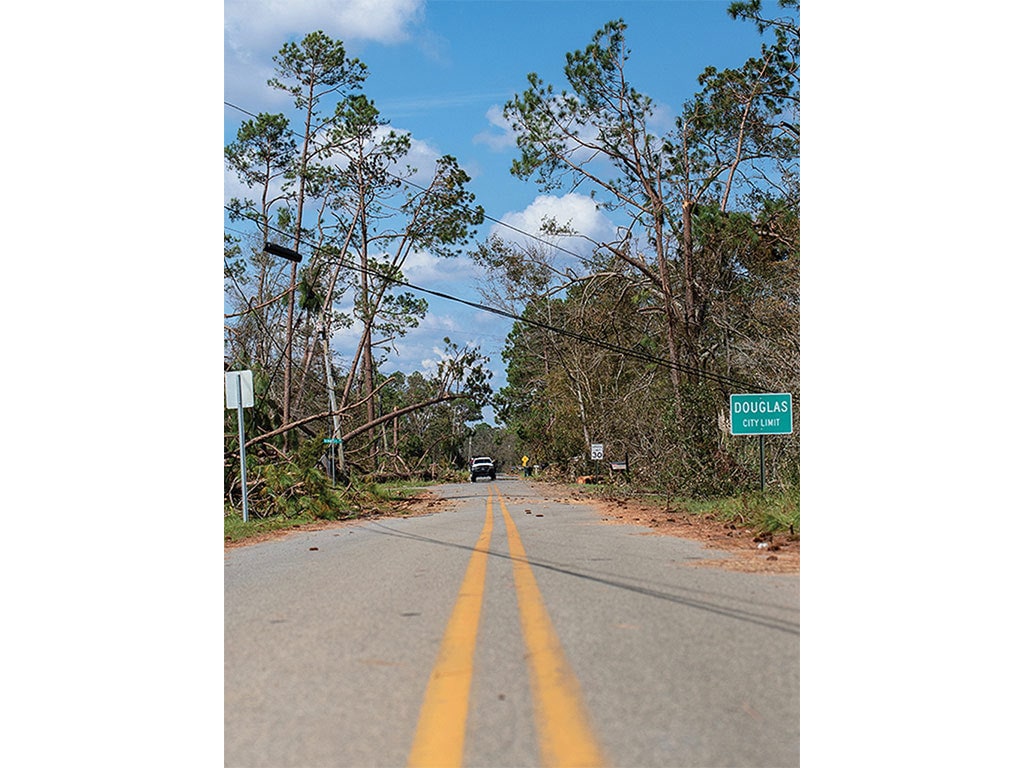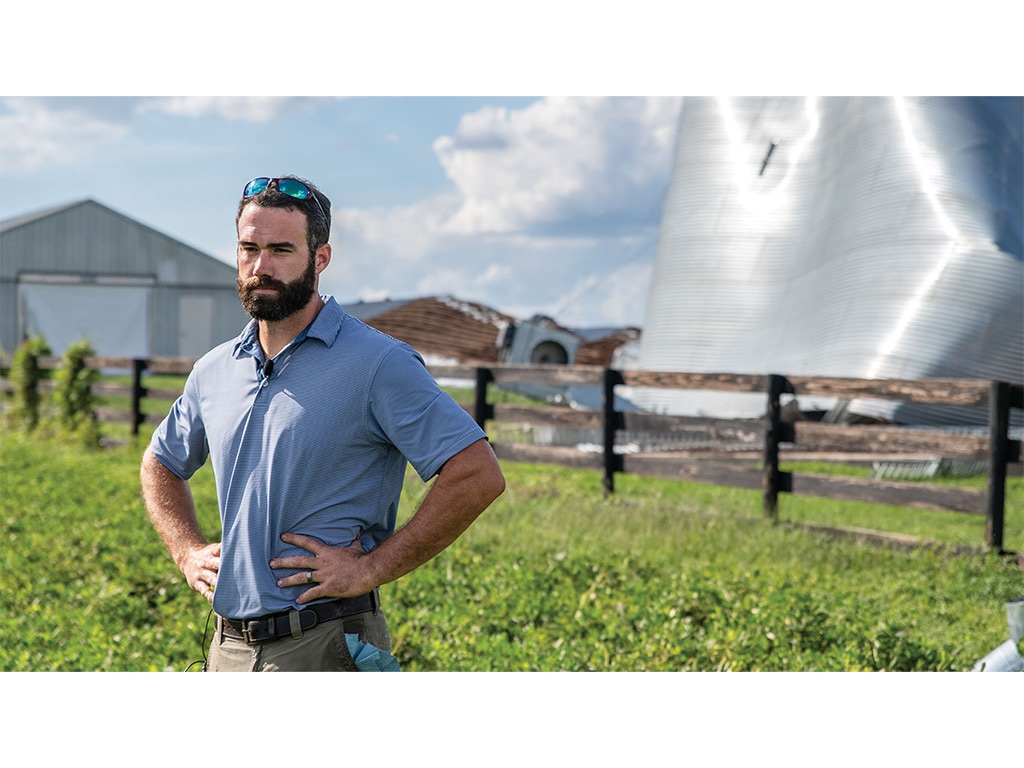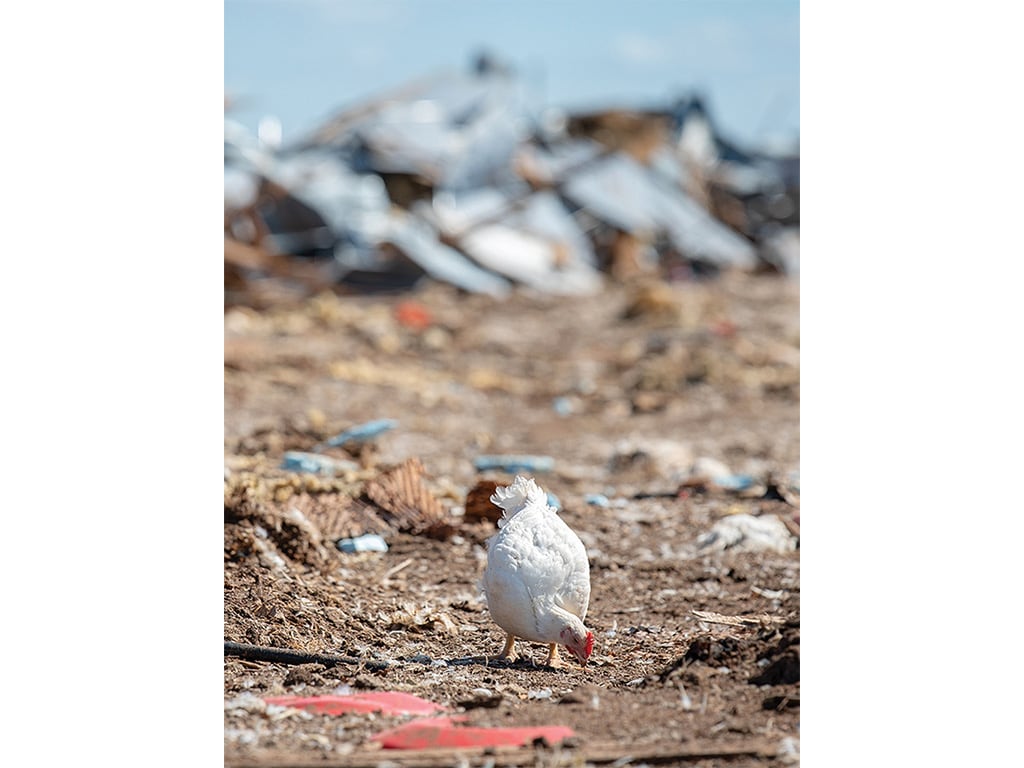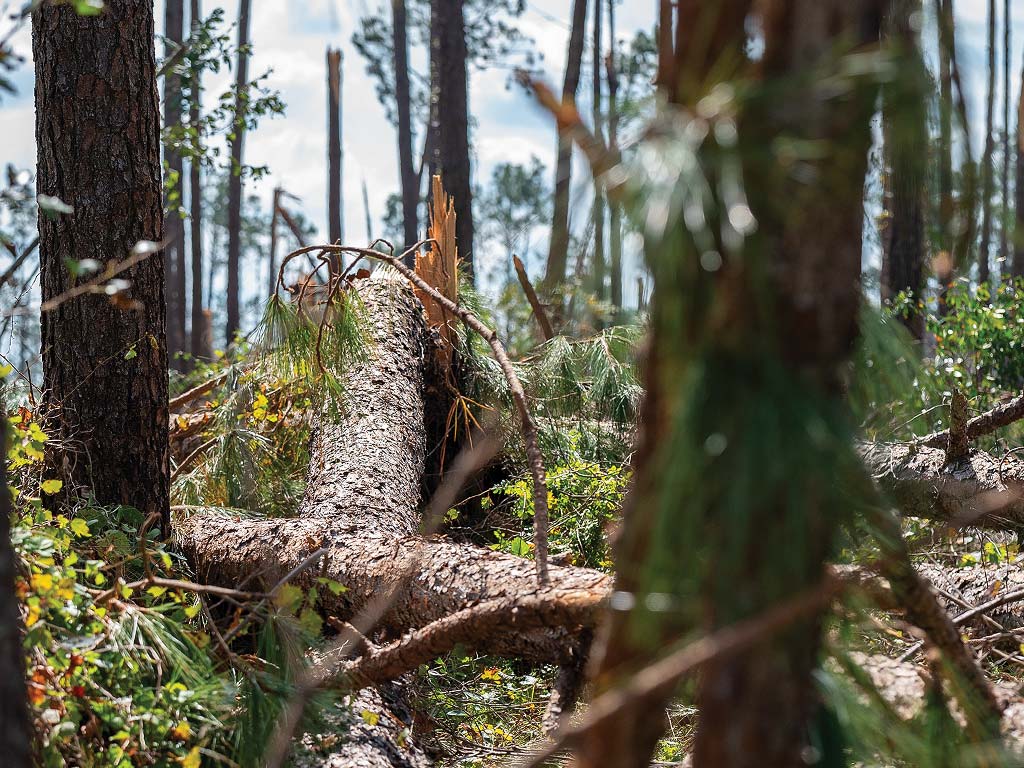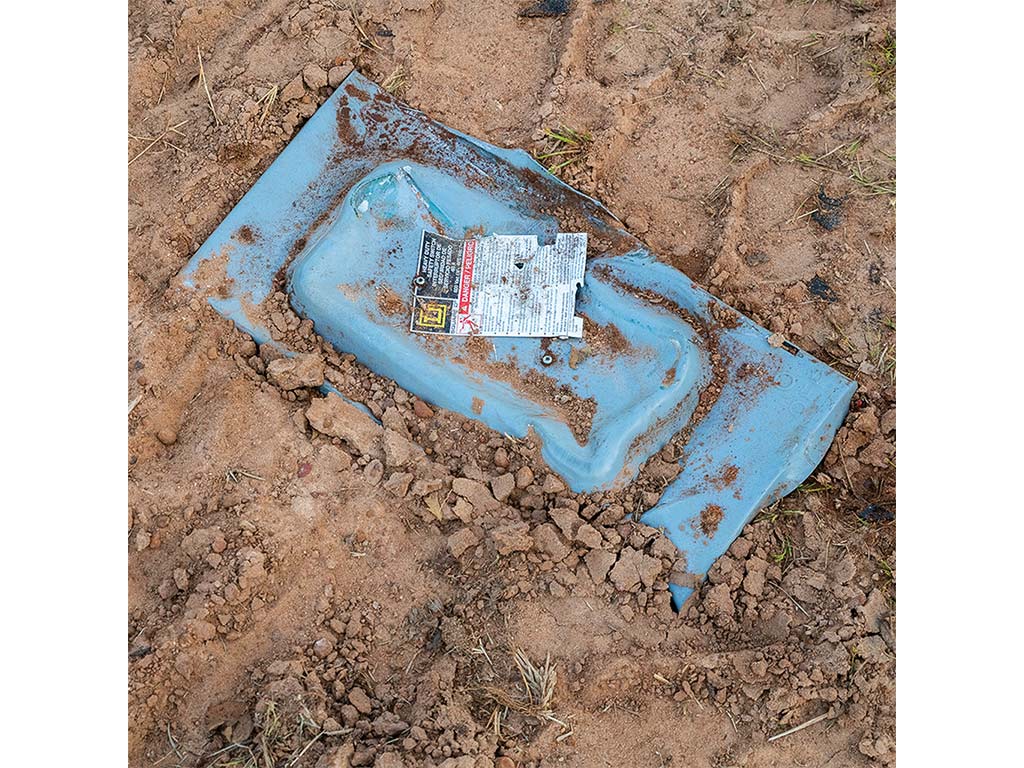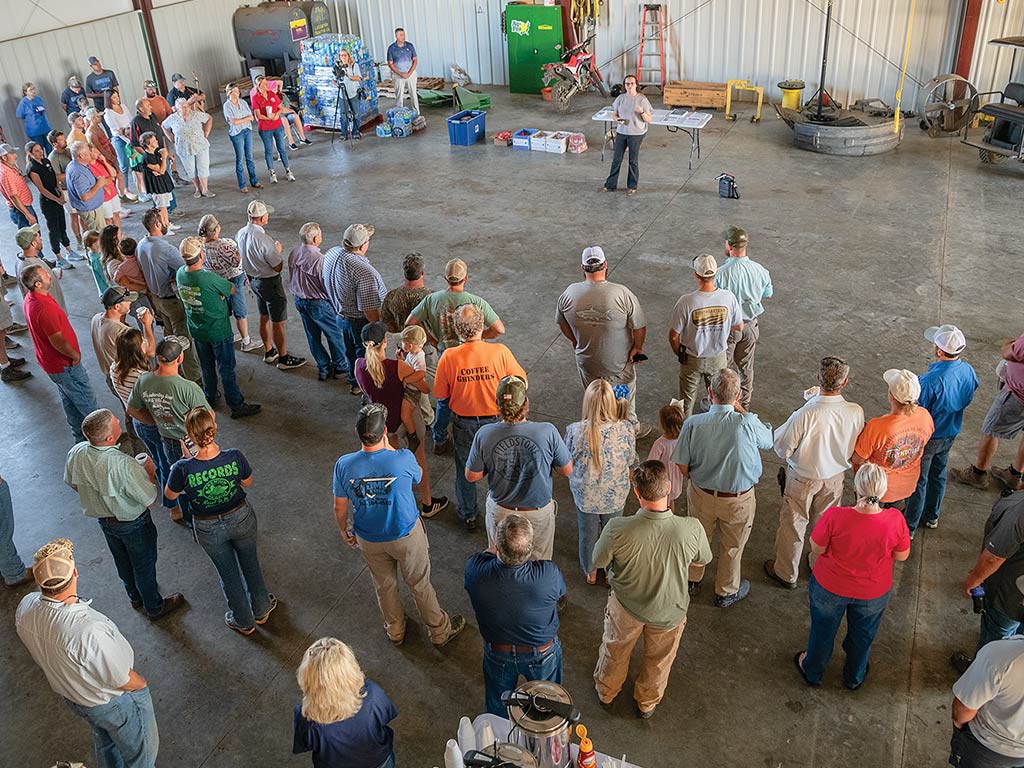Agriculture April 01, 2025
Coming Together When the Lights Went Out
Finding peace amidst chaos left by Hurricane Helene.
by Katie Knapp
Clay McKinnon isn't the crying type. But on September 27, 2024, as dawn exposed Hurricane Helene's devastation across his family's farm outside Douglas, Ga., tears fell. "Everything's gone," were the only words he could manage.
What started as 100 acres in 1957 under his grandfather's care now looked like a war zone—a story repeated that day from the Gulf of Mexico up to the Appalachian Mountains.
State government, University of Georgia, and commodity group officials estimate Hurricane Helene will cost Georgia $5.5 billion in agricultural and timber losses. Coffee County, Ga., where the McKinnons live was one of the worst hit areas.
"It feels like ground zero," Clay's father Wayne McKinnon said immediately after the storm. Several tornado spin-offs added to the severity.
Where orderly rows of chicken houses once stood, chaos reigned. Where timber grew for the next generation, splintered trunks pointed skyward. And where cotton fields were ripe with potential, the ground looked snow-covered. On McKinnons' farm alone, the 120+ mph winds and inches of rain that roared through left more than $3 million in damages.
"It's life-altering stuff," Billy Waldron said. He runs the Deep South Peanut buying point in Douglas, Ga. "We were prepared, as prepared as you can be in South Georgia."
Hurricane Helene was the third named storm to hit this area in 13 months, and it hit at the worst time. Farmers were already hurting from the down-turned ag economy with high input costs, low commodity prices, and rising interest rates. They were banking on a good harvest. Waldron thinks this could take out 10 to 15 percent of his customers' operations.
The loss of timber hits particularly hard. "Trees that guys planted when they were my age or younger for their kids to have—they're gone," Clay McKinnon explains. The pine stands represented retirement plans, college funds, and legacies for the next generation.
Georgia has more privately owned forest land than any other state. At the time of writing, timber loss estimates topped the state's list at $2.65 billion with the cost of replanting not yet accounted for. According to UGA Extension reports, this is more than the next six commodities combined: poultry, nursery crops, cotton, pecans, beef, and vegetables.
Shared strength. Farmers with working equipment immediately headed to their neighbors' farms. Those with generators shared their power. Others set aside their own cleanup efforts—and any other differences—to help clear trees from homes. The community showed its toughness and resilience; yet, the magnitude was overwhelming.
Ashley Smith knew something had to change when she saw her fifteenth farmer cry. As the Coffee County Extension agent, she was used to giving agronomic and regulatory advice. But in the hours and days after Hurricane Helene leveled her county, her role quickly changed to counseling.
She knew nothing she could say or do would immediately help her vulnerable farmers. A colleague told her, "We can at least pray." She thought, "That they could!"
A couple days later more than 70 farmers, community leaders, and government officials gathered in McKinnons' powerless machine shed, their usual harvest conversations replaced by damage assessments and strong handshakes swapped for gentle pats on shoulders.
A local pastor opened with a call to "Pray that we can find peace in the midst of chaos." Several elected officials and government staff then assured the community—still deep in shock and early grief—that financial aid was coming. Most importantly, the gathering proved no one was in this alone.
Above. Chicken houses were ripped to shreds, and trees and power lines dangled across roads like delicate holiday decorations. Clay McKinnon surveys a peanut field bordering his family's Douglas, Ga., farmstead. Hurricane Helene left countless broiler chickens homeless, beautiful pine tree stands crumpled like the used pieces of paper they were to become, and no power anywhere in the region. A week after the storm—well before power or water was restored across Coffee County—farmers gathered in McKinnons' shed to pray and learn about disaster relief efforts.
Beyond visible damage. For many, the hardest part comes later. "At first, it's 'I'm going to fight back. This isn't going to beat me. We're going to rebuild,'" says Dr. Anna Scheyett, who studies rural mental health in UGA's School of Social Work and College of Agricultural and Environmental Sciences. "And then reality starts to hit."
Months later—when blue tarp-covered houses and snarled tree lines are the expected sight—the devastation is measured in quieter, more nuanced ways. It's in the strain of three-hour creditor meetings, in farmers questioning their calling, and having the appetite to eat balanced meals.
"This isn't a job; it is an identity," Scheyett explains. "When your farm is gone, that's a huge reorganization of self that needs to happen." She notes trauma affects everything from memory to decision making—just when farmers need to be their sharpest to deal with paperwork.
A new way forward. Amid the mounting debt and piles of debris, there is some good news.
Farmers are no longer silent about their pain. They're sharing their struggles, opening up about their grief, and finding strength in each other.
"People are talking about it. They're using the words 'mental health.' They're checking in on each other. The level of stigma is not as high as it used to be," Scheyett says anecdotally.
Smith sees this playing out in real time. One young farmer told her, "If it's meant to be, it's supposed to be easier than this." Another simply admitted the mental strain of climbing the combine ladder through harvest was tough. He told her, "Usually I like picking. This year, it's just not fun."
The shift can be partially attributed to a society-wide effort to improve mental health and focused efforts on rural mental health through university and government programs, such as the material compiled here: https://site.extension.uga.edu/mentalwellbeing/.
Many health insurance plans now cover online and texting therapy services. And in the U.S. and Canada anyone can call or text 988 any time, no matter the struggle.
Indeed, it is okay to not be okay and seek help.
Smith is glad when her farmers let out some stress to her. "Right now," she says, "my main job is making sure they're all okay to farm another year. I tell them when we share joy, we double it. But when we share sorrow, we each have half." ‡
Read More

AGRICULTURE/EDUCATION
Another Roadside Attraction
Roadside stands are a window into local agriculture.



